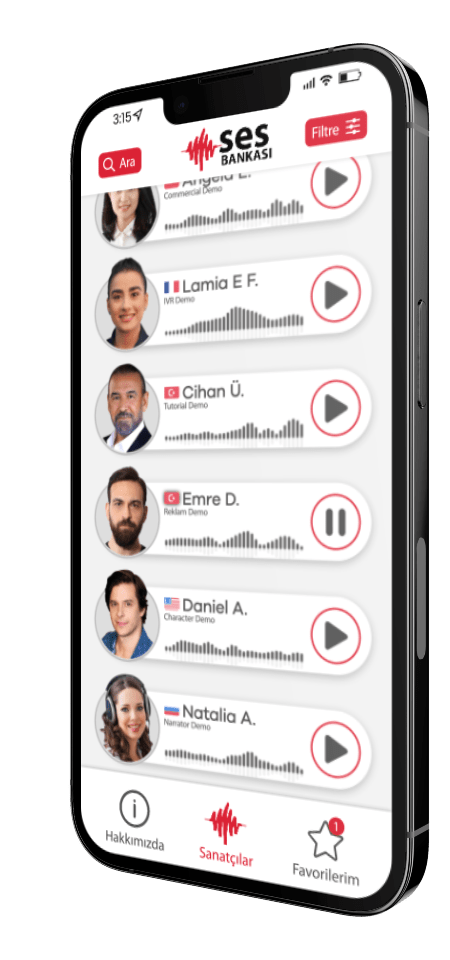The Importance of Local Dialect for Good Dubbing and Voice Over
There are many factors that directly affect the professionalism of the artist in the dubbing and voice-over industry. The skills that the voice actor will add to himself in order to be in harmony with the character is one of them. The voice actor should be able to fulfill the local dialect and dialect features in dubbing and voice-over works. It is very important for the voice actor, who wants to perform a performance in accordance with the personality of the character, to have a command of the dialect and dialect beforehand.
So, why is the use of dialect and dialect important in the dubbing industry? In this article, we will talk about the use and techniques of the concepts of dialect and dialect in the dubbing industry.
Briefly, What is the Mouth?
The difference between dialect and dialect takes place at the beginning of the concepts that cause intense debates in the world of Turkology. Dialect is defined as the name given to small branches existing in a dialect and based on pronunciation differences, speeches of various regions and cities of a country that are different from each other in terms of pronunciation. Dialect, in other words, means the sum of speech forms and individual languages that are similar to each other in the dialect combined by the same language. The sounds and utterances that vary depending on the various regions, provinces and districts of a country indicate the concept of dialect. When the dialect is examined, various differences emerge between the spoken language and the written language of a region. For example, concepts such as Istanbul dialect, Aydın dialect, provincial dialect and Nevşehir dialect are among the main dialects in Turkey Turkish.
What is Dialect in Short?
The concept of dialect, which is often confused with dialect, refers to the branches of a language separated at a certain date. In the concept of dialect, there are variations of a language within the same country. Dialectic is known as the branches of a language that do not stray too far from its roots. The concept of dialect, which is the regional way of saying a language, is also expressed as an accent. The branches that are separated from the mother tongue, which do not have much difference in sound and shape, are located within the borders of the dialect. Türkiye Turkish that we use in Turkey is also an example of dialect. To give a comprehensive example, we can list dialects such as Azerbaijani, Uzbek, Kyrgyz and Nogai among the main dialects of Turkish.
The Importance of Using Local Dialect / Dialect and Dialect in Voice and Dubbing: How Should Local Speech be Transmitted?
The language that a person learns from the immediate family environment and then from the related circles constitutes the concept of mother tongue. In the following periods, people's interaction with other environments creates dialect and dialect differences. The concept of dialect and dialect, which occupies a large place in daily life, also appears in the dubbing industry. It is very important for the quality of the work to be able to use the mouth and dialect while dubbing or dubbing.
The ability of the artist providing voice-over or dubbing services to transmit the local speech directly affects the quality of the work to be produced. At this point, it is an important criterion that the voice actor who transfers the local speech to the work does not exaggerate. Because local speeches presented to the audience in an exaggerated way sound quite repulsive. At the same time, the pronunciation of words in the local speech used may be exaggerated when listened to by the locals. For this reason, it is expected that an artist who does voice-over work professionally should know local conversations and have a good command of the techniques. Transferring sound without exaggeration the voice actorhttps://bibersa.com/seslendirme-sanatcilari/ The main task in this regard is to be able to read the text sincerely and accurately.
Dialecting and Dialecting for Dubbing and Voice Over: Proper Techniques and Tips
People who work or plan to work professionally in the field of vocalization should pay extra attention to the dialect and dialect factor. Artists who want to create a professional voiceover or dubbing can follow these tips on using dialect and dialect:
- Dialect and Dialect Concepts: Having knowledge about the concepts of dialect and dialect is among the first steps to be taken in order to perform correctly in the field of vocalization. While adapting these concepts to his work, the artist aims to present a correct performance in accordance with the character's personality.
- Research: Before participating in the dubbing and dubbing work, the artists should do preliminary research in order to give the correct dialect and dialect. At this stage, it is very important to know where the character comes from in order to make dialects and accents. Knowing the speech characteristics of that region gives the voice actor the advantage of performing more effectively. For voice-over, it is possible to make a correct dialect and accent by researching the character's birthplace, place of residence and characteristics of the character.
- Using Resources: In addition to character and region-specific research, it is possible to obtain information on the concepts of dialect or dialect from different sources. Voice and dubbing artists can review various resources on the internet for dialect or dialect. Thanks to these resources, the artist has access to detailed information about these concepts. Knowing how the character speaks according to the place of birth and the region where he lives is among the main factors that facilitate the work of the artist.
- Audio Recording: Progress of the voice and dubbing artist in rehearsals by listening to himself while making a dialect or dialect gives a more effective performance. In order to perform correctly, you can take a sound recording to check the compatibility with the dialect and dialect beforehand. In this way, you will notice the missing parts in the dialect or dialect beforehand.
- Getting Help from Experts: People who provide professional services in the field of voice-over and dubbing may not reach a sufficient level with only research. Getting help from an expert in dialect and dialect is extremely important for professional dubbing. Thanks to the expert support, you can make the correct dialect and dialect according to your character.
- Practicing: It is recommended that the artist, who has learned the correct techniques for dialect and dialect, should practice in order not to forget and to gain experience. Once you know the necessary techniques and tips, you can make it easier to integrate with the character by practicing. In particular, imitating the speech features of the character is an important practice for making a correct dialect and dialect.
- To listen: Listening to yourself is as important as mastering the techniques for making dialects and dialects. Even if you think that you have done everything correctly, listening to your voice after the vocalization will give you a much different experience. It should not be forgotten that the most important way of performing a correct performance in the field of voice-over and dubbing is to listen. First of all, you can start by listening to the place where the character was born and the speech characteristics of the people in the region. Then, listening to your own recordings allows you to make a good amount of mouth and accent.
- Understanding the Voice Over Director's Expectations: In the works in the field of voice acting, the expectations of the director as well as the professionalism of the artist affect the dialect and dialect factor. At this stage, the director facilitates the process by expressing his expectations and wishes about the character's speech. In order to give the right accent and accent, the director also needs to make a certain preparation before starting the work. It will be a good start for the director to learn about the character in question.
- Using the Dialect in Dose: In the art of dubbing and dubbing, it is an important plus for the person who is doing the voiceover to be able to exhibit the dialect and dialect features. However, the accent that is not done properly affects the project and the audience negatively. The voice actor who knows the necessary techniques and methods should stay away from exaggerated accent works while reflecting the character.
The Art of Character Building in Dialect and Dialect Dubbing and Voiceover: The Role of Local Accents
Dubbing and dubbing are at the forefront of the sectors that need the use of dialect and dialect. Aiming to give the best character reflections, the voice-over industry needs to correctly display the use of dialect and dialect in order to do this job. At this stage, an artist who masters local accents becomes the person who increases the quality of the work by putting out effective performances in character voices.
So, what is the role of local accents in dubbing and dubbing?
- Capturing the Audience's Attention: Local accents increase the likelihood that the voice actor will be noticed by the listener. In particular, presenting the text that reflects the character together with the dialect and dialect creates an important sign of arousal by the listener. The voice-overs that are able to attract the attention of the audience provide positive feedback depending on the purpose of the project.
- Connecting with the Audience: The use of dialect and dialect is an important step for the performer to touch the listener. The fact that local accents can reach people who are in the region or know the region positively affect the purpose of the project. Since the dialect and dialect factor strengthens the bond between the listener and the listener, the rate of retention in mind also increases.
- Understanding and Explaining the Character: A good understanding of the character in voice-over and dubbing works is very important to be able to explain it correctly. A voice-over or dubbing artist who understands the character well manages to convey his role in the most appropriate way. For this reason, it is possible to say that local accents have a key role in understanding and expressing the character.
BiberSA Production It offers the most suitable talents for your project together with voice actors who are registered with a voice-over agency and can speak all languages of the world. You can use BiberSA Production's wide service network to reach the dubbing service you need for different projects from one place. Thanks to local and foreign voice actors with different abilities, you can view the options suitable for your project and request an instant quote.
Working with Turkey's and the world's most famous voice actors, BiberSA Production gives voice to your dubbing projects with high sound quality equipment. BiberSA, which closely follows the voice-over and dubbing studios in the world, delivers your dubbing works as soon as possible without sacrificing quality in the light of current developments and technologies. You can contact us to complete your dubbing works professionally and quickly with BiberSA Production.




















